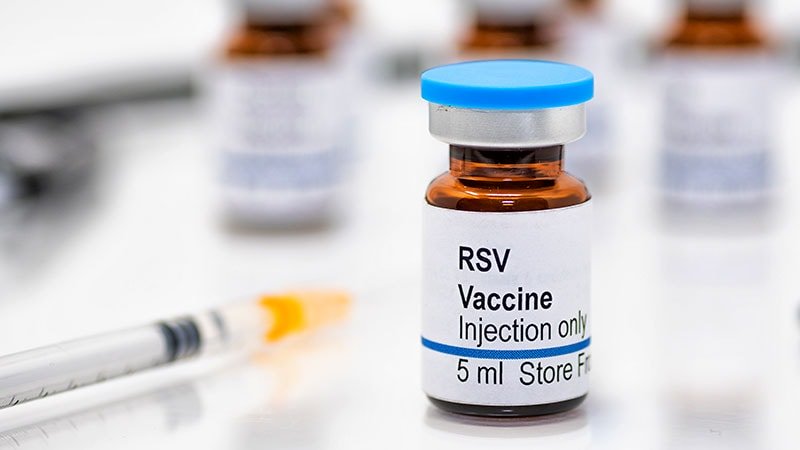The UK Health Security Agency (UKHSA) has reported that the respiratory syncytial virus (RSV) vaccine is around 82% effective in preventing hospitalisation among adults aged 75-79.
The data come from a study run in partnership with Nottingham University Hospitals and other NHS trusts. UKHSA called the results “strong protection.”
The study used data from a hospital-based sentinel surveillance system covering 14 hospitals in England. It included adults admitted for acute respiratory infections (ARI) between October 1, 2024, and March 31, 2025.
Of 1006 adults hospitalised with ARI, 173 (17.2%) had RSV infection.
Vaccine Efficacy by Clinical Subgroup
Data showed vaccine efficacy against hospitalisation of:
- 82.3% for any RSV-associated ARI
- 86.7% for severe cases needing oxygen supplementation
- 88.6% for lower respiratory tract infection, including pneumonia
- 77.4% for exacerbations of chronic lung disease
- 78.8% for exacerbations linked to chronic heart disease, lung disease, or frailty
- 72.8% for adults with immunosuppression
Maternal RSV Vaccination Also Effective
The UKHSA also reviewed data from the maternal RSV vaccination programme, introduced alongside the older adults programme in September 2024.
A separate study, published in The Lancet Child & Adolescent Health, found the maternal RSV vaccine reduced infant hospitalisation risk by 72% when given more than 14 days before birth.
Both programmes used Pfizer’s bivalent pre-F vaccine, Abrysvo.
The programme for older adults offers the vaccine to those turning 75, as well as a one-off catch-up campaign for all adults aged 75-79 years. The maternal programme offers the vaccine from 28 weeks of pregnancy and onwards.
Uptake Rates Vary Across Groups
By June 30, uptake among eligible older adults had risen to 62.9%, up from 60.3% in March.
Among 36,657 women who gave birth in March, 54.7% had received the RSV vaccine during pregnancy.
Coverage in the maternal programme varied by ethnic group. Uptake ranged from 73.3% among women of Chinese ethnicity to 26.4% among Black and Black British Caribbean women.
RSV Seasonality and Surveillance Findings
RSV activity typically starts in October. Bronchiolitis, the main clinical presentation in infants, is primarily caused by RSV. The risk of hospitalisation with RSV infection is highest among babies born in late summer or autumn.
The UKHSA’s first annual RSV report reviewed the 2024-2025 season. It found:
- RSV activity began around mid-October across all UK nations
- It peaked between November 18 and December 8 (weeks 47-49)
- It declined to baseline levels by late February (weeks 7-8 of 2025)
Primary care surveillance included around 300 GP practices in England, where patients presenting with ARI were swabbed. Peak RSV positivity was:
- 53.1% in children under 5 during week 46 (November 11-17)
- 18.5% in adults aged 75 and over during week 49 (December 2-8)
Hospital emergency department data also showed that bronchiolitis in infants under 1 year peaked in late November.
MHRA Warns of Guillain-Barré Syndrome Risk
In July, the Medicines and Healthcare products Regulatory Agency (MHRA) issued a drug safety alert on RSV vaccines. Clinicians are advised to monitor for symptoms of Guillain-Barré syndrome (GBS) following vaccination.
GBS is an acute demyelinating disease affecting the peripheral nervous system. Early symptoms include tingling, numbness, or pins and needles in the feet and hands, followed by muscle weakness and difficulty moving joints. In some cases, it can progress to breathing difficulties, drooping facial muscles, problems with swallowing or speech, and double vision. Although rare, GBS can be fatal.
Dr Sheena Meredith is an established medical writer, editor, and consultant in healthcare communications, with extensive experience writing for medical professionals and the general public. She is qualified in medicine and in law and medical ethics.
Source link : https://www.medscape.com/viewarticle/rsv-jab-shields-older-adults-hospitalisation-2025a1000kod?src=rss
Author :
Publish date : 2025-08-04 14:03:00
Copyright for syndicated content belongs to the linked Source.
